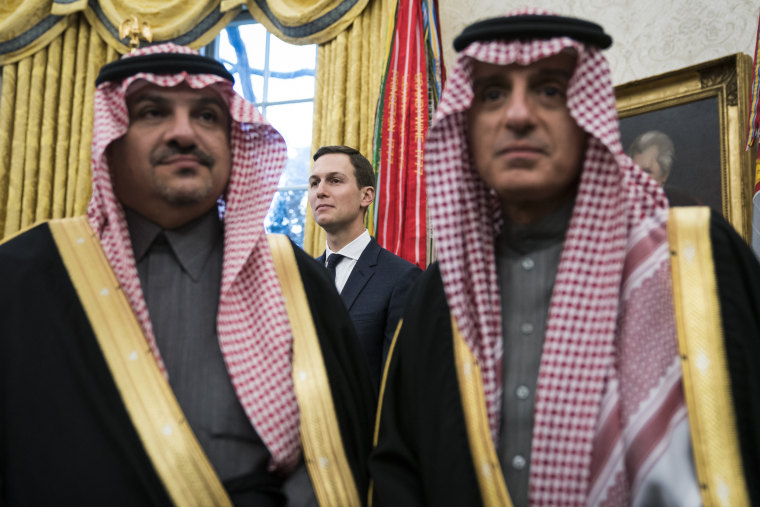After North Korea and Iran, Saudi Arabia has long been the dangerous power-in-waiting as far as nuclear weapons are concerned. For years, the Saudis have watched anxiously as hostile Iran, right next door, edged ever closer to developing a deliverable nuclear device.
And for years, the Saudis begged the United States, and just about anyone else who might listen, for a nudge toward nuclear fission. This desire has long been couched only in the most anodyne of terms. The Saudi government says it needs nuclear reactors, but only to develop electrical production and desalination networks as the world turns away from oil. But while this argument has been made to a succession of American presidents, each has politely refused to consider the request.
For years, the Saudis begged the United States, and just about anyone else who might listen, for a nudge toward nuclear fission.
Now the House Committee on Oversight and Reform has issued a report touching off a probe into the Trump administration’s “efforts to transfer sensitive nuclear technology to Saudi Arabia.” The report suggests such a program was launched by former national security advisor Michael Flynn and elements of the American nuclear industry. It came just as Donald Trump’s son-in-law and advisor Jared Kushner, was developing a close relationship with Saudi Crown Prince Mohammed bin Salman who has been a leading force behind his nation’s nuclear aspirations.
When I first visited Saudi Arabia, over a decade ago, I was quietly warned that if Iran were ever to test a viable nuclear device, the Saudis would be forced to obtain one of their own and in the fastest way possible. At the time, it seemed most likely that the source would be the fellow Islamic nation of Pakistan, which has a robust nuclear arms program and has relied on Saudi largesse during times of economic distress.
SIGN UP FOR THE THINK WEEKLY NEWSLETTER HERE
These plans have hardly faded with time. As Crown Prince Mohammad bin Salman told “60 Minutes” in 2018, “Without a doubt, if Iran developed a nuclear bomb, we would follow suit as soon as possible.” In that interview the prince himself singled out Pakistan as a possible source. And, just last week, the crown prince stopped by Pakistan, leaving behind with its new prime minister Imre Khan and army chief Gen. Qamar Bajed Jawa $20 billion worth of Saudi contracts and a pledge to strengthen military ties between the two countries.
Then MBS, as the crown prince is known, was off to China, another nuclear power attempting a delicate balancing act between Iran and other Mideast powers — and trying its best to be close friends to both. China remains a signatory of the nuclear control agreement with Iran that Trump has ditched. It is also a formidable nuclear power itself with a thorough grasp of all steps in the nuclear fuel cycle needed to produce both peaceful power plants and weapons.
This week, Jared Kushner is on a swing through the Middle East with stops including Saudi Arabia and the Persian Gulf. A White House official told me that the aim of his trip is to consult with key stakeholders across the region about the economic component of his peace plan. But of course, civilian nuclear power is central to economic development.
It is critical to understand production of nuclear fuel for a civilian power plant is just a short step away from a different type of fuel that is suitable for a nuclear weapon. And, most worryingly, the Saudis seem anxious to produce their own fuel domestically rather than buying it, at lower prices, from the United States or any other nation that adheres to non-proliferation controls.
Moreover, Saudi Arabia has never agreed to follow conventional nuclear safeguards designed to prevent the drift of material from the civilian to the military domain. Until now, Saudi Arabia has had, for years, a small nuclear research reactor in a research center. It has put forward plans to build two other small facilities with any number of prospective countries including France and South Korea. Eventually, in the next decade the Kingdom is anxious to have at least a dozen large reactors in operation — a complex and expensive network that could be difficult to monitor for compliance with non-proliferation rules.
The Congressional report focuses heavily on alleged collusion between the Trump administration — particularly General Michael Flynn — and elements of the American nuclear industry that were anxiously attempting to cement an $80 billion sale of nuclear technology to Saudi Arabia. With Flynn gone, the assumption was that the plan had died with him. But in February, a meeting was said to have been held in the White House with the nuclear industry to try to keep the plan alive.
All of this could not come at a worse moment as restraints on nuclear proliferation around the world appear to be coming unglued. Trump has given the six-month notice needed to withdraw from the Intermediate Nuclear Forces (INF) treaty with Russia. President Vladimir Putin has followed suit and announced Russia’s own withdrawal. At the same time, the New START treaty controlling ICBM levels may also be in play. All these moves have thrown into chaos the carefully constructed architecture of nuclear stability built brick by brick over the last 50 years.
One by one, the United States and its allies have succeeded in removing nuclear programs from wannabe nuclear states. Libya under Colonel Moammar Gadhafi gave up its program, as did South Africa. Trump now believes he is en route to a similar outcome with the (still prospective) nuclear arsenal of North Korea.
If the United States is going to visibly pull out of critical nuclear pacts — and keep others from entering — then it absolutely cannot go about peddling critical nuclear technology to others nations like Saudi Arabia by the back door. If nations like Saudi Arabia move toward a bomb, the genie of nuclear proliferation is really out of the bottle.

